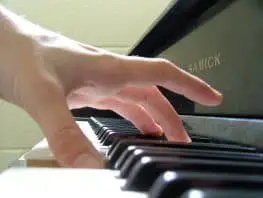How To Practice Piano Exercises
What type of piano exercises do you need as a beginner and how can they help you develop strength and flexibility at the piano?
As you begin playing piano, simply the act of pressing down the keys-and synchronizing your fingers-in addition to learning music theory-and how to read notes-as well as trying to sit correctly-and keep you hand position right – phew!- is usually more than enough...!
But after a while it is a good idea to start working with separate piano exercises to help you to build up strength, awareness and security in your playing technique.
Movement Patterns

One more plus (of many) with special technical exercises is that you become more aware of the different movement patterns used when playing the piano.
To recognize a pattern of notes as a movement instead of a “bunch of notes”, helps you to both read and perform music better as well as to play more beautifully without unnecessary tension.
I know there are pianists and teachers who consider piano technique exercises pointless and that by studying lots of repertoire and making your own exercises from the “real” piano pieces, you will learn all you need.
Even though I personally do not agree completely with this, it is a great way of learning a piece to actually work on passages, aka “passage work”, in the music itself and to make up your own exercises from it.
However- this does not apply to beginner pianists, as you need to be a really good player to begin with, to be able to make such choices, knowing what you need to work on!
Different Areas of Piano Technique
1. Finger Exercises and Drills:
Exercises as opposed to Etudes, are technical exercises that introduce you to movement patterns for your hands, arms and whole body, as well as finger drills, introducing one difficulty at a time. (Not really very pretty to listen to!).
Charles-Louis Hanon wrote the famous The Virtuoso Pianist which is a collection of real finger drill exercises. Get a free PDF and practice advice here.
Read more: http://www.onlinepianocoach.com/piano-exercises.html#ixzz2vun6Rerg.
Read more: http://www.onlinepianocoach.com/piano-exercises.html#ixzz2vun6Rerg.
2. Scales, Chords and Arpeggios:
- Firstly, they get you acquainted with the basic tools or elements that music is made from, which helps you understand music theory and to read music better.
- Secondly, they teach us the common movement patterns we meet when learning piano pieces. It makes a huge difference, when learning a new piece, to immediately know what fingering to use, as well as what movement is required.
- Thirdly, you will learn to "see" the written music as being either chords; broken or blocked, scales; or part of a scale and intervals.
3. Etudes:
Even though the word Etude means Exercise as well, we say "Etudes" about exercises that are more like real pieces. Etudes are pieces that contain several difficulties at the same time, for example learning how to make a melody be heard over a subtle accompaniment.
Some of these etudes are used as repertoire since they are really beautiful, and some are more boring. But the point with the etude is to practice technique in a more musical context, involving phrasing and musical thought, not just drills.
Practicing Piano Exercises
Depending on your preference, here are some ways to build your piano technique with a daily piano exercise regimen. These are just a few suggestions; but do try to work- if not every day- at least a few times a week with some form of technical exercises.
A. The All-At-Once Method:
Each day you set aside certain minutes of practicing piano exercises, in addition to learning new pieces, maintaining old repertoire, learning by heart, sight reading and improvising. If you practice 60 min. sessions in a day it could look like this:
- 10 minutes scales
- 10 min. technical exercises
- 10 min. work on an etude.
- 10 min. learn notes etc of a new piece
- 10 min. learn a few measures of a piece by heart
- 10 min. play through repertoire (any piece you know well and preferably by heart)
B. The Different-Every-Day Method:
During the week you might like to focus more on one different aspect each time:
- Day 1: Piano exercises and technique drills plus repertoire work.
- Day 2: Scales, chords and arpeggios and learning a new piece.
- Day 3: Etudes and memorization of an already learned piece.
- Day 4: Improvise, make your own pieces, record yourself- play around!
- Day 5: Perform for someone- even if only by video recording for yourself.
- Day 6: Sight reading, watch DVD’s with great pianists; go to a concert (!).
- Day 7: Listen to great music and read about great musicians! (By the swimming pool sipping a huge drink with an umbrella, maybe…mmm!)
C. The Don't-Wanna-Spend-too-Much-Time Method(!):
After a while, when you have learned some exercises you really like and feel does good for you, put together a short piano exercise “repertoire” of about 10-15 minutes and use as a warm up every day (played by heart), and then focus on your pieces for your repertoire the rest of the time.
Related Pages
- Time to Practice Piano- How Much Should I Practice?
- Practice Piano With Your Brain
- Effective Piano Practice Techniques
- How To Use a Metronome For Practice
Read more: http://www.onlinepianocoach.com/piano-exercises.html#ixzz2vum1Nd00
http://www.onlinepianocoach.com/free-piano-lessons-online.html
No comments:
Post a Comment